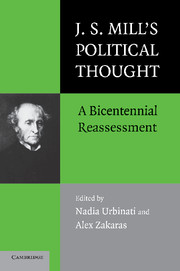Book contents
- Frontmatter
- Contents
- List of Contributors
- Introduction
- PART ONE LIBERTY AND ITS LIMITS
- PART TWO DEMOCRACY AND THE INDIVIDUAL
- PART THREE BEYOND NATIONAL BORDERS
- 11 Cosmopolitan Patriotism in J. S. Mill's Political Thought and Activism
- 12 Mill and the Imperial Predicament
- 13 Making Sense of Liberal Imperialism
- 14 Mill's “A Few Words on Non-Intervention”: A Commentary
- Bibliography
- Index
11 - Cosmopolitan Patriotism in J. S. Mill's Political Thought and Activism
Published online by Cambridge University Press: 08 January 2010
- Frontmatter
- Contents
- List of Contributors
- Introduction
- PART ONE LIBERTY AND ITS LIMITS
- PART TWO DEMOCRACY AND THE INDIVIDUAL
- PART THREE BEYOND NATIONAL BORDERS
- 11 Cosmopolitan Patriotism in J. S. Mill's Political Thought and Activism
- 12 Mill and the Imperial Predicament
- 13 Making Sense of Liberal Imperialism
- 14 Mill's “A Few Words on Non-Intervention”: A Commentary
- Bibliography
- Index
Summary
No one disapproves more, or is in the habit of expressing his disapprobation more strongly than I do of the narrow, exclusive patriotism of former ages which made the good of the whole human race a subordinate consideration to the good, or worse still, to the mere power & external importance, of the country of one's birth. I believe that the good of no country can be obtained by any means but such as tend to that of all countries, nor ought to be sought otherwise, even if obtainable.
J. S. Mill, “Letter to Maurice Wakeman,” 25 October 1865, CW XVII: 1108–9Mill's reputation is as a thinker; but we shall never fully understand his thought if we fail to recognize that he was always politically engaged and had a strong sense of himself as a shrewd strategist.
William Stafford, 1998b, 108Like many other aspects of John Stuart Mill's thought, his attitude towards nationhood, nationalism, and related issues has been subjected to all sorts of misinterpretations and partial readings. In a vast body of literature (from at least as early as the publication of John [later Lord] Acton's essay ‘Nationality’ (1862) to the beginning of the twenty-first century), Mill has been seen as representing – and often incarnating – some of the most extreme – and, at the same time, mutually contradictory – positions vis-à-vis nationality and related phenomena.
- Type
- Chapter
- Information
- J.S. Mill's Political ThoughtA Bicentennial Reassessment, pp. 277 - 297Publisher: Cambridge University PressPrint publication year: 2007
- 6
- Cited by



